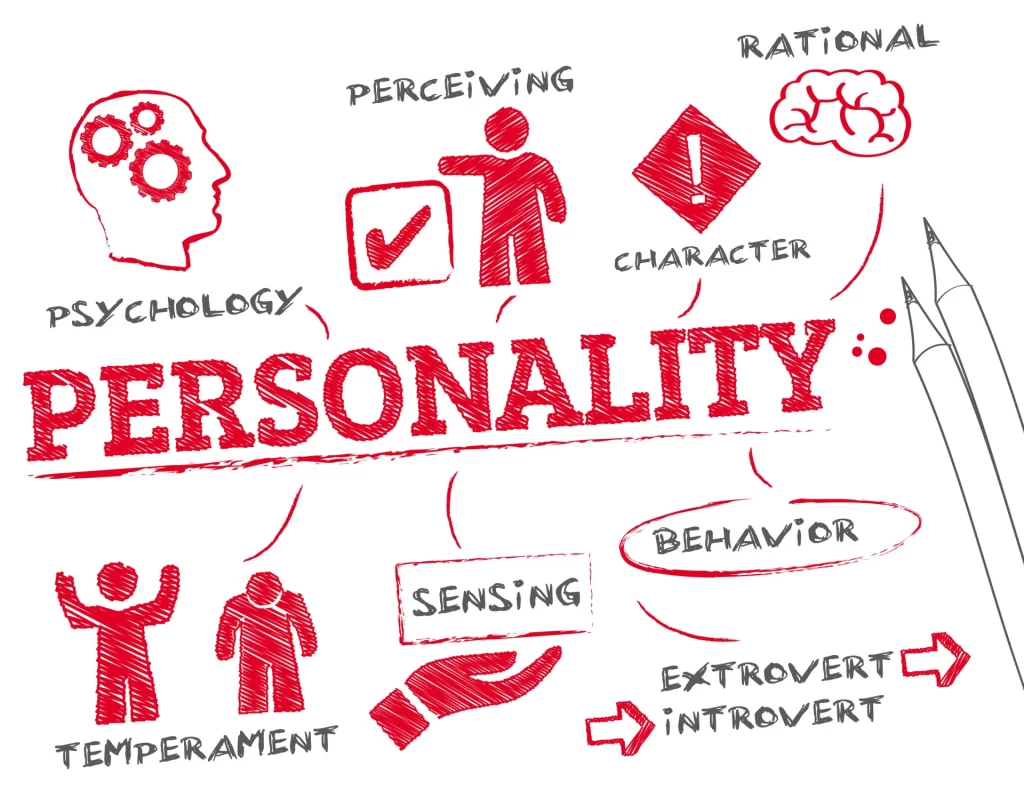Why is personality important in psychology?
Personality is a core concept in psychology because it helps explain and predict individual differences in behavior, thoughts, and emotions. Understanding personality is crucial for several reasons:
1. Explains Individual Differences
- Uniqueness: Personality accounts for why people respond differently to the same situation. Even when faced with similar challenges, individuals may react in unique ways based on their personality traits.
- Predictive Power: By understanding a person’s personality, psychologists can predict behavior patterns, such as how someone might react to stress or how they are likely to interact with others.
2. Guides Personal Development and Self-Understanding
- Self-Awareness: Knowledge of one’s personality traits can lead to greater self-awareness, helping individuals understand their strengths, weaknesses, and tendencies. This insight can be the first step toward personal growth and self-improvement.
- Setting Goals: Personality can influence life choices, such as setting realistic personal goals. For example, someone with high conscientiousness might set ambitious and structured goals, while someone more open to experiences might focus on exploring new possibilities.
3. Influences Mental Health and Well-Being
- Understanding Disorders: Personality traits can play a role in mental health. For instance, high levels of neuroticism are associated with a greater risk of anxiety and depression, while high extraversion may correlate with better social support and mental well-being.
- Tailoring Therapy: Therapists often consider personality traits when designing treatment plans. Knowing whether a person is introverted or extroverted, for instance, can influence the approach a therapist uses to help them cope with social anxiety.
4. Helps in Relationship Building and Social Interactions
- Compatibility: Understanding personality can help predict relationship compatibility in both personal and professional contexts. For example, high agreeableness is often associated with strong interpersonal relationships because such individuals are typically cooperative and empathetic.
- Conflict Resolution: By recognizing personality differences, people can better navigate conflicts and misunderstandings, improving communication and fostering stronger connections.
5. Guides Career Choices and Professional Success
- Career Fit: Personality assessments can help individuals identify careers that align with their traits. For example, someone high in openness might thrive in creative roles, while someone with high conscientiousness might excel in structured, detail-oriented positions.
- Leadership and Teamwork: Understanding personality helps in building effective teams and identifying leadership potential. For instance, extraversion and openness are often linked to effective leadership and innovation.
6. Explains and Predicts Human Behavior
- Behavioral Patterns: Personality theories, such as the Big Five model, help psychologists predict behavioral patterns across different situations. For example, individuals high in conscientiousness are likely to be punctual, organized, and reliable.
- Understanding Motivation: Personality plays a significant role in understanding what motivates people. For instance, people high in achievement orientation (a trait related to conscientiousness) may be more motivated by goals and recognition.
7. Cultural and Social Implications
- Cultural Differences: Personality psychology helps in understanding how culture influences personality traits and vice versa. For instance, individualistic cultures may emphasize traits like independence, while collectivistic cultures may prioritize traits like agreeableness and conformity.
- Social Behavior: Personality influences social behavior, such as how people form social bonds, navigate group dynamics, and interact in different cultural settings.
Applications of Personality Psychology
- Clinical Psychology: Personality assessments help diagnose and treat psychological disorders. Tools like the MMPI (Minnesota Multiphasic Personality Inventory) aid clinicians in understanding a patient’s personality profile and tailoring treatment plans.
- Organizational Psychology: Employers use personality assessments in recruitment and team building to ensure a good fit between employees’ traits and job requirements.
- Educational Psychology: Understanding students’ personalities helps educators adapt teaching methods and provide support based on individual needs.
- Counseling and Coaching: Personality insights guide counselors and coaches in helping clients with career decisions, relationship issues, and personal development.
Personality is crucial in psychology because it provides a framework for understanding the complexity of human behavior. It helps psychologists make sense of why people think, feel, and act the way they do, allowing for better predictive accuracy and tailored interventions. Whether it’s understanding mental health issues, improving interpersonal relationships, guiding career choices, or enhancing personal growth, personality is a fundamental concept that informs nearly every aspect of psychological research and practice.

What are the 4 personalities in psychology?
In psychology, one of the well-known frameworks for understanding personality is the Four Temperaments model. This model, which has its roots in ancient Greek medicine, categorizes personalities into four primary types based on different temperaments. These four types are:
1. Sanguine
- Characteristics: Sanguine individuals are typically sociable, outgoing, and enthusiastic. They are often considered the “life of the party,” enjoying being around others and seeking social interactions. They tend to be optimistic, fun-loving, and spontaneous.
- Strengths: Their energetic and friendly nature makes them great at building relationships and working in teams.
- Challenges: They may struggle with staying focused on long-term tasks, and their impulsiveness can sometimes lead to hasty decisions.
2. Choleric
- Characteristics: Choleric personalities are ambitious, determined, and strong-willed. They are natural leaders, often taking charge of situations and being goal-oriented. They are confident and assertive, often driven by a need to achieve and succeed.
- Strengths: Their leadership qualities and decisiveness make them effective in roles that require direction and strategic planning.
- Challenges: They can be prone to impatience, quick-temperedness, and may sometimes come off as domineering or insensitive to others’ feelings.
3. Melancholic
- Characteristics: Melancholic individuals are thoughtful, detail-oriented, and often introspective. They tend to be analytical, organized, and prefer working in structured environments. They are usually deep thinkers and are often perfectionists.
- Strengths: Their attention to detail and ability to focus make them excellent at tasks requiring precision, planning, and analysis.
- Challenges: They may be prone to overthinking, pessimism, and may struggle with indecision or anxiety, especially when things don’t go as planned.
4. Phlegmatic
- Characteristics: Phlegmatic personalities are calm, reliable, and peaceful. They are often seen as easy-going and agreeable, preferring to avoid conflict. They are patient, supportive, and good at mediating between others.
- Strengths: Their steady nature makes them excellent in roles that require consistency, patience, and teamwork. They are often the glue that holds groups together.
- Challenges: They may struggle with motivation, tend to avoid taking risks, and may have difficulty asserting themselves or making quick decisions.
These four personality types—Sanguine, Choleric, Melancholic, and Phlegmatic—offer a simplified way to understand human behavior and temperament. While modern psychology recognizes that personality is far more complex and can’t be fully captured by just four types, this model provides a useful framework for understanding some of the fundamental differences in how people think, feel, and act.
What is the psychological theory of personality?
Psychological theories of personality aim to explain individual differences in behavior, emotions, and thinking patterns. These theories provide frameworks for understanding how personality develops and manifests over time. Here are some of the major psychological theories of personality:
1. Psychoanalytic Theory (Sigmund Freud)
- Key Concepts:
- Id, Ego, and Superego: Freud proposed that personality consists of three parts: the Id (instinctual desires), the Ego (reality-oriented mediator), and the Superego (moral standards).
- Psychosexual Stages: Freud suggested that personality develops through a series of stages (oral, anal, phallic, latency, and genital), where each stage focuses on different pleasure areas of the body.
- Defense Mechanisms: Techniques like repression, denial, and projection are ways the ego copes with anxiety and internal conflict.
- Focus: Unconscious motives, childhood experiences, and internal conflicts.
- Criticism: Lacks empirical evidence and is considered outdated by modern standards but remains influential in understanding the unconscious mind.
2. Neo-Freudian Theories
- Key Figures: Carl Jung, Alfred Adler, Karen Horney, and Erik Erikson.
- Key Concepts:
- Carl Jung: Introduced concepts like the collective unconscious and archetypes. He also developed the idea of introversion and extraversion.
- Alfred Adler: Emphasized the importance of social interest and the drive for superiority as key motivators in personality development.
- Karen Horney: Focused on social and cultural factors, proposing that basic anxiety and interpersonal relationships shape personality.
- Erik Erikson: Developed the psychosocial stages of development, emphasizing social influences throughout a person’s life.
- Focus: Social and cultural factors, conscious and unconscious processes.
3. Trait Theory
- Key Figures: Gordon Allport, Raymond Cattell, Hans Eysenck, and the creators of the Big Five model.
- Key Concepts:
- Traits: Personality consists of broad, stable characteristics called traits that influence behavior across various situations.
- Big Five Personality Traits (OCEAN Model): The most well-known trait theory, which includes Openness, Conscientiousness, Extraversion, Agreeableness, and Neuroticism.
- Cattell’s 16 Personality Factors: Raymond Cattell proposed a model with 16 factors that describe the different dimensions of human personality.
- Focus: Measuring and describing individual personality differences based on consistent traits.
- Criticism: May overlook the influence of situational factors on behavior.
4. Humanistic Theory
- Key Figures: Carl Rogers and Abraham Maslow.
- Key Concepts:
- Self-Actualization: Maslow proposed a Hierarchy of Needs, with self-actualization as the highest need, representing the fulfillment of one’s potential.
- Self-Concept: Carl Rogers emphasized the importance of self-concept, or the perceptions and beliefs individuals have about themselves. He introduced the idea of unconditional positive regard, which is essential for healthy personality development.
- Positive Psychology: Humanistic theories focus on the positive aspects of human nature, emphasizing growth, free will, and self-improvement.
- Focus: Individual growth, personal responsibility, and the innate drive for self-fulfillment.
- Criticism: Lacks scientific rigor and is criticized for being too optimistic about human nature.
5. Behavioral Theory
- Key Figures: B.F. Skinner, John Watson, and Ivan Pavlov.
- Key Concepts:
- Classical Conditioning: Pavlov demonstrated how associations between stimuli and responses can shape behavior.
- Operant Conditioning: Skinner showed how behavior is influenced by rewards (reinforcement) and punishments.
- Environmental Influence: This theory argues that personality is the result of learned behaviors from interactions with the environment, rather than internal traits or unconscious drives.
- Focus: Observable behavior, environmental influence, and learned responses.
- Criticism: Neglects internal thoughts, feelings, and biological influences.
6. Social-Cognitive Theory
- Key Figures: Albert Bandura and Julian Rotter.
- Key Concepts:
- Reciprocal Determinism: Bandura proposed that behavior, personal factors (e.g., beliefs), and the environment interact and influence each other.
- Observational Learning: Bandura emphasized the importance of learning by observing others, also known as modeling.
- Self-Efficacy: Bandura introduced the concept of self-efficacy, or the belief in one’s ability to succeed in specific situations.
- Locus of Control: Rotter’s concept differentiates between internal locus of control (believing one can influence outcomes) and external locus of control (believing outcomes are due to external factors).
- Focus: The interaction between cognitive processes, behavior, and the environment.
- Criticism: Can be seen as overly focused on cognitive processes and may underemphasize unconscious influences.
7. Biological and Evolutionary Theories
- Key Figures: Hans Eysenck, David Buss, and others studying genetics and neuroscience.
- Key Concepts:
- Genetic Influences: Research suggests that genetics play a significant role in shaping personality traits.
- Brain Structure and Neurotransmitters: Personality may be influenced by brain structure, hormones, and neurotransmitter levels (e.g., dopamine, serotonin).
- Evolutionary Psychology: David Buss and others propose that personality traits evolved because they were advantageous for survival and reproduction.
- Focus: The biological basis of personality, including genetics, brain function, and evolution.
- Criticism: May not fully account for environmental and social influences.
8. Cognitive Theory
- Key Figures: George Kelly, Aaron Beck, and Albert Ellis.
- Key Concepts:
- Personal Constructs: George Kelly proposed that individuals have personal constructs (mental frameworks) that shape how they perceive the world.
- Cognitive Distortions: Beck and Ellis studied how irrational or distorted thinking patterns can influence personality and behavior.
- Focus: The role of thoughts, beliefs, and cognitive processes in shaping personality.
- Criticism: May underemphasize the role of emotions and unconscious influences.
Summary Table
| Theory | Key Figures | Key Concepts | Focus |
|---|---|---|---|
| Psychoanalytic | Sigmund Freud | Id, Ego, Superego, Psychosexual Stages | Unconscious motives, childhood experiences |
| Trait | Gordon Allport, Big Five | OCEAN Traits (Big Five) | Measuring personality differences |
| Humanistic | Carl Rogers, Maslow | Self-Actualization, Self-Concept | Growth, self-fulfillment, positive potential |
| Behavioral | B.F. Skinner, Pavlov | Classical/Operant Conditioning | Learned behaviors, environmental influences |
| Social-Cognitive | Albert Bandura | Observational Learning, Self-Efficacy | Interaction of behavior, environment, cognition |
| Biological/Evolutionary | Hans Eysenck, David Buss | Genetic Influences, Brain Structure | Biological basis of personality |
| Cognitive | Aaron Beck, George Kelly | Personal Constructs, Cognitive Distortions | Role of thoughts and beliefs |
Sum Up:
Each theory offers unique insights into personality, and no single theory can comprehensively explain all aspects of personality. Instead, these theories complement each other, providing a more complete picture of why people behave the way they do. Understanding these diverse perspectives can help individuals, psychologists, and professionals better understand personality development and individual differences.

What are the five principles of personality psychology?
The five principles of personality psychology are foundational ideas that guide the study of personality, explaining how it develops, influences behavior, and can be understood through scientific methods. These principles help us understand the complexity and dynamics of personality across different situations and over time. The commonly recognized principles are:
1. Consistency
- Principle: Personality traits exhibit relative consistency across time and different situations.
- Explanation: This principle suggests that people tend to behave in predictable ways across various contexts. For example, a person who is generally extroverted will likely show outgoing behaviors in different settings, whether at a party or in a meeting. Although behavior can vary depending on the situation, underlying personality traits remain relatively stable.
- Significance: Consistency is key to defining personality because it allows for the prediction of behavior based on established traits.
2. Individual Differences
- Principle: People differ in their personality traits, leading to unique patterns of thoughts, emotions, and behaviors.
- Explanation: This principle highlights that no two individuals have the same personality. Even among people who might score similarly on certain traits (like extraversion), there will still be individual variations. These differences are influenced by genetic, environmental, and situational factors.
- Significance: Understanding individual differences helps explain why people respond differently to the same situation. It is crucial for applications in areas like therapy, education, and organizational behavior.
3. Influence of the Situation
- Principle: Personality interacts with situational factors to influence behavior.
- Explanation: This principle acknowledges that while personality traits play a significant role in shaping behavior, the specific context or situation also exerts a powerful influence. For instance, an introverted person might act more extroverted at a close friend’s wedding compared to a formal business event.
- Significance: Recognizing the impact of situational factors helps in understanding the variability in behavior and reduces the risk of oversimplifying personality based solely on traits.
4. Biological and Environmental Influences
- Principle: Personality is shaped by both biological (genetic, neurological) and environmental (social, cultural) factors.
- Explanation: This principle highlights the interplay between nature (biology, genetics) and nurture (upbringing, experiences). For example, temperament (a biological predisposition) can be influenced by early childhood experiences and cultural norms, which shape how personality traits are expressed and developed over time.
- Significance: Acknowledging both biological and environmental influences provides a more holistic understanding of personality development. It explains how innate predispositions and life experiences work together to form unique personalities.
5. Change and Stability
- Principle: While personality is generally stable, it can also change over time due to life experiences, age, and personal growth.
- Explanation: This principle addresses the dynamic aspect of personality, suggesting that certain core traits tend to remain stable (e.g., basic temperament), but other aspects can change due to significant life events, personal development, or deliberate efforts at self-improvement. For example, people tend to become more agreeable and conscientious as they age, a process known as the maturity principle.
- Significance: Understanding both the stability and potential for change in personality helps in predicting long-term behavior and recognizing opportunities for personal growth and adaptation.
Summary Table
| Principle | Key Idea | Significance |
|---|---|---|
| Consistency | Personality traits are stable over time | Enables prediction of behavior |
| Individual Differences | Each person has unique personality traits | Explains behavioral diversity among individuals |
| Influence of the Situation | Behavior is shaped by both personality and context | Highlights the interaction between traits and environment |
| Biological and Environmental Influences | Both genetic and environmental factors shape personality | Provides a holistic view of personality development |
| Change and Stability | Personality is generally stable but can change | Recognizes potential for personal growth and adaptation |
Conclusion
These five principles form a comprehensive framework for understanding personality in psychology. They help psychologists study how personality traits manifest, remain consistent, or change over time, and how they interact with external factors. Recognizing these principles allows us to better understand ourselves and others, guiding practical applications in areas like career development, mental health, and personal growth.



